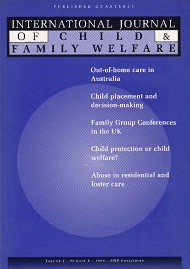Planning in partnership? An assessment of process and outcome in UK Family Group Conferences
Abstract
The proponents of the Family Group Conference (FGC) model argue that it is a radical new approach which provides the basis for a more effective partnership between families and professionals in child care decision-making. Considerable international interest is being shown in the model, yet assessment of its strengths and weaknesses relative to more traditional approaches, particularly in child protection, is relatively uniformed by good quality research-based evidence. This article reports on the findings of a three-year investigation of the model's operation in one UK case study, in the context of other available research evidence. It concludes that, while the research indicates that the FGC process is more enabling of family participation, the evidence on the outcomes of the FGC process is more ambiguous. More rigorous research is necessary on the longer-term consequences of the decisions made by FGCs for the welfare of the children concerned.

